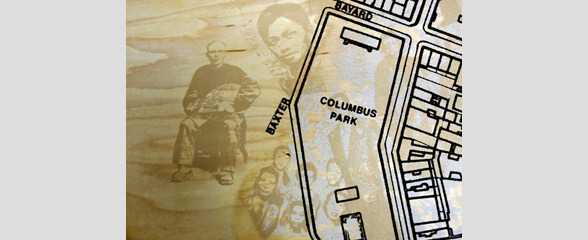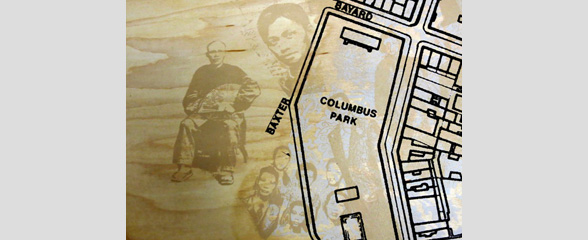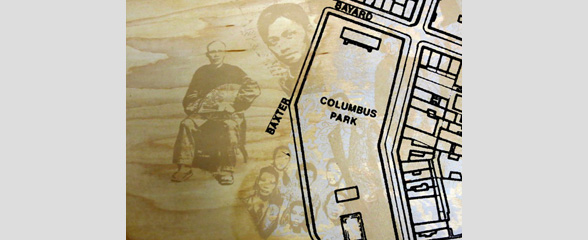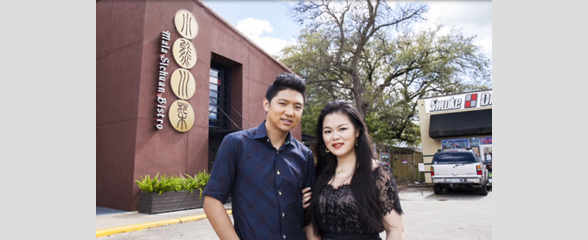Chinatown

2008.040.007 Oral History Interview with Fani Jacobson January 22, 2008
Fani Jacobson was employed for 53 years at the Daily Forward, a Yiddish newspaper, located in a landmark building near Seward Park. Jacobson was also involved in the socialist organization formerly known as the Workmens Circle (now called Workmens Circle Arbeter Ring). She describes the Lower East Side as a mixed neighborhood comprised of mainly Italian and Jewish sections. She particularly enjoyed the intimate shopping experience and going to the Garden Cafeteria nearly every day for lunch. Jacobson designates 1948 as the neighborhood’s turning point – co-ops were built, Italian residents moved out of the city and onto Long Island, younger generations moved away to avoid living in tenements, and wealthy buyers were able to purchase large pieces of real estate, which were torn down and replaced with luxury buildings. In summary, Jacobson laments the loss of the small town ambience and the disappearance of most of the once-burgeoning Jewish community on the Lower East Side.

2008.040.014 Oral History Interview with Jan Lee June 18, 2008
MOCA sits down with Jan Lee to discuss his familys longstanding presence in Chinatown and some of the changes that he has witnessed over the decades as the owner of 21 Mott Street. Jan shares the story of how his family first became rooted in Chinatown when his grandfather arrived there at the end of the 19th century. He explains the changes that occurred in Chinatown during the huge wave of Chinese immigration in the 1970s, especially regarding the rise of violence and gangs in the area. Jan also shares the story of how his sister fought this trend through the Chinatown Community Young Lions program and shares anecdotes about his participation in the program. The conversation also delves into Jan’s thoughts on gentrification, both current and past. He offers his thoughts on the importance of Chinatown’s community stakeholders, the internal divisions in Chinatown, some of the dangers posed by external investment, the role that NYC is currently playing, and the role that he believes the city should play to encourage responsible development.

2008.040.016 Oral History Interview with Mannar Wong April 20, 2008
In her interview, Mannar Wong describes the changes she has seen in Chinatown spanning the past forty years. Emigrating with her mother and father from Hong Kong in the early seventies, Wong was raised in Chinatown and moved to Brooklyn with her parents in the eighties when she was a pre-adolescent. In the nineties, she later returned to the neighborhood she now refers to as “Chinatown Little Italy.†Wongs parents initially disapproved of her decision to move back into Chinatown, a place they regarded as a “starting point†for immigrants.
However, Wong considers present-day Chinatown “hip and appealingâ€, which she says was the partly the result of a community of creative types who renovated the area and acted as trailblazers for others to settle there. Wong classifies gentrification as, for the most part, making a place more desirable to people. Although, she warns that the question of whether gentrification is positive or negative is a loaded question – for instance, while she enjoys the appeal and “creature comforts†of the neighborhood, Wong predicts that she will eventually move out due to rising rent prices. Moreover, even though she does not consider herself an activist, she disagrees with small family-owned businesses being replaced by businesses that are not useful to the community.

2008.040.021 Oral History Interview with Sio Wai Sang April 18, 2008
Sio Wai Sang sits down with MOCA to discuss his experience in Chinatown since he first arrived in the 1970s by way of Macau and the Dominican Republic. He discusses his experience working as a jeweler, how he set the precedent for immigrant jewelers in Chinatown, and how the counterfeit industry has negatively affected Chinatown businesses by making them all seem cheap. He also shares his thoughts on the more close-knit community culture of Chinatown when he lived there and how he perceives it to have changed over the past several decades as the different generations come and go. Mr. Sang also talks about how he believes Chinatown should move forward and develop by creating a Business Improvement District. He believes that it will improve the commercial side of Chinatown and leave the residential side unharmed because of the internal cohesion of the Chinese community which wants to keep Chinatown Chinese. He also expresses his belief that plans for development should be approached with a cautious perspective, so new developments don’t become too commercial and harm the cultural character.

2008.040.024 Oral History Interview with Cindy Lin February 15, 2008
Ming Xian Lin, also known as Cindy, tells MOCA about her experience immigrating to Chinatown from Shanghai where she had worked first as a farmer during the cultural revolution and then as a telephone operator. She discusses what Chinatown looked like in the early 1990s when she arrived, going into depth about her experiences working in different garment factories and her concerns about the crime in the area. Cindy also explains how the neighborhood has changed and offers some of her thoughts about gentrification and what she thinks the government and people in the community should do about it. She also shares her thoughts on the importance Chinese immigrants learning english and how she found her drive to pick up the language at 38 years old. She concludes by discussing how she hopes her family will remain engaged with Chinatown and the broader American world.

2016.037.028 Oral History Interview with Cori Xiong and Hen Chan
Cori Xiong and Hen Chan started the Mala Sichuan Bistro restaurant business in Houston, Texas. The two met while studying at University of Texas Austin. Xiong father was a food engineer in Sichuan, China and convinced Xiong to start her own family business. With the help of family, Xiong was able to bring authentic Sichuan flavors to the United States. All the chefs that work in her restaurants have studied at a culinary school in Sichuan. Xiong and Chan both believe that regional Chinese cuisine will continue to be popularized and accepted in America. They hope to see a future where Americans are more sensitive to authentic Chinese food.